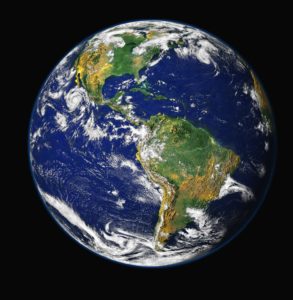 If you want to be truly depressed about Earth's future, reading a recent article by an international group of scientists will produce feelings of horror, anxiety, and helplessness. Even the title was bleak: "Underestimating the Challenges of Avoiding A Ghastly Future".
If you want to be truly depressed about Earth's future, reading a recent article by an international group of scientists will produce feelings of horror, anxiety, and helplessness. Even the title was bleak: "Underestimating the Challenges of Avoiding A Ghastly Future".
They laid out in depressing detail how life on Earth and its future is far, far worse than we realize. It's all due to our inability to come to terms with and take action on biodiversity loss (massive species extinctions!), increasing population and consumption, and climate change. Which is accelerating and getting worse year by year.
The 17 scientists reviewed more than 150 studies to produce a summary of the state of our natural world. They stress that environmental conditions in the future on Earth will be far worse than we generally realize. The loss of biodiversity, the accelerating climate change in the coming decades, along with ignorance and inaction, is threatening the survival of all species, including humans.
The bottom line: We (governments, individuals, corporations, industries) must all take action now to avoid the worst case scenarios, including extinction of our species. As the researchers said: "The science underlying these issues is strong, but awareness is weak."
A good discussion of the article results, including what must be done. Some excerpts from The Conversation: Worried about Earth's future? Well, the outlook is worse than even scientists can grasp
Anyone with even a passing interest in the global environment knows all is not well. But just how bad is the situation? Our new paper shows the outlook for life on Earth is more dire than is generally understood.
The research published today reviews more than 150 studies to produce a stark summary of the state of the natural world. We outline the likely future trends in biodiversity decline, mass extinction, climate disruption and planetary toxification. We clarify the gravity of the human predicament and provide a timely snapshot of the crises that must be addressed now.
The problems, all tied to human consumption and population growth, will almost certainly worsen over coming decades. The damage will be felt for centuries and threatens the survival of all species, including our own.
Getting to grips with the problem. First, we reviewed the extent to which experts grasp the scale of the threats to the biosphere and its lifeforms, including humanity. Alarmingly, the research shows future environmental conditions will be far more dangerous than experts currently believe.
What’s more, positive change can be impeded by governments rejecting or ignoring scientific advice, and ignorance of human behaviour by both technical experts and policymakers.
Our research also reviewed the current state of the global environment. While the problems are too numerous to cover in full here, they include:
-
- a halving of vegetation biomass since the agricultural revolution around 11,000 years ago. Overall, humans have altered almost two-thirds of Earth’s land surface
- about 1,300 documented species extinctions over the past 500 years, with many more unrecorded. More broadly, population sizes of animal species have declined by more than two-thirds over the last 50 years, suggesting more extinctions are imminent
- about one million plant and animal species globally threatened with extinction. The combined mass of wild mammals today is less than one-quarter the mass before humans started colonising the planet. Insects are also disappearing rapidly in many regions
Then there’s climate change. Humanity has already exceeded global warming of 1°C this century, and will almost assuredly exceed 1.5 °C between 2030 and 2052. Even if all nations party to the Paris Agreement ratify their commitments, warming would still reach between 2.6°C and 3.1°C by 2100.
